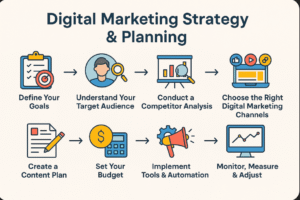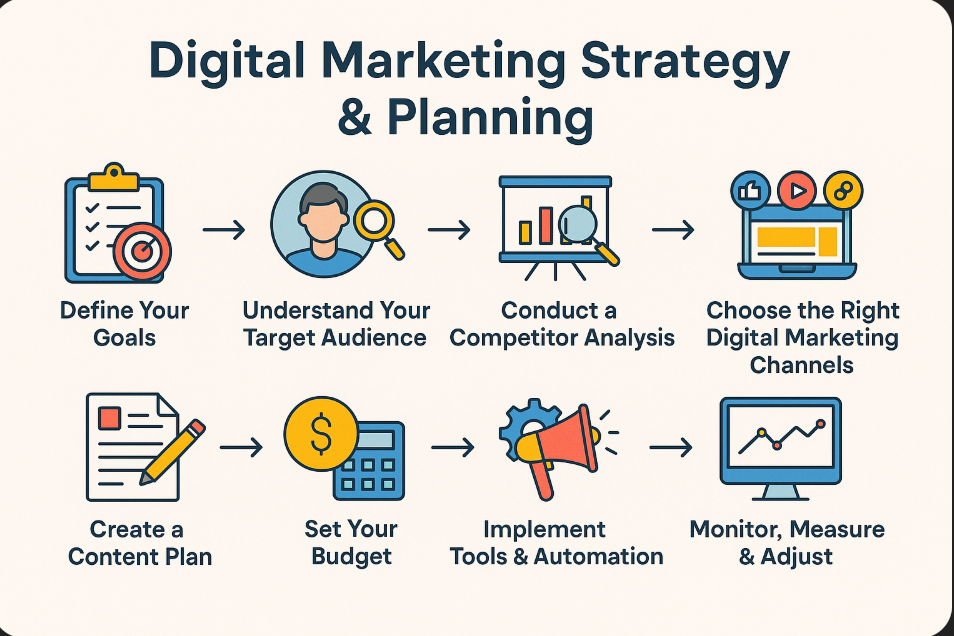Table of Contents
✅ Meta Description:
Learn how to create a powerful digital marketing strategy and plan from scratch. Explore goals, channels, budgeting, KPIs, and tools to boost your online success.
Mastering Digital Marketing Strategy & Planning: A Complete Beginner’s Guide
In today’s digital-first world, businesses cannot afford to ignore the power of a well-planned digital marketing strategy. Whether you’re a startup, small business, freelancer, or marketing student, understanding how to design and implement a strategy can be the difference between online visibility and digital obscurity.
This blog explores the steps, tools, and key elements of crafting a strong digital marketing strategy and how to plan effectively for long-term success.
🌐 What is a Digital Marketing Strategy?
A digital marketing strategy is a long-term plan designed to achieve specific business goals using digital channels such as search engines, social media, email, and websites. It acts as a blueprint to attract, engage, convert, and retain your target audience online. Best digital marketing courses in dehradunhttp://dsom.in click the link and get to know more about
📋 Why is Digital Marketing Planning Important?
Without a plan, your marketing efforts can become scattered and ineffective. A good digital marketing plan:
-
Aligns marketing goals with business objectives
-
Helps track performance through data and analytics
-
Maximizes return on investment (ROI)
-
Avoids wasted time and budget
🎯 Steps to Create an Effective Digital Marketing Strategy
1. Define Your Goals
Start by answering: What do you want to achieve?
Common goals include:
-
Increase website traffic
-
Generate leads or sales
-
Improve brand awareness
-
Boost customer engagement
-
Grow social media presence
Use the SMART goal framework:
-
Specific
-
Measurable
-
Achievable
-
Relevant
-
Time-bound
📝 Example: “Increase website traffic by 25% in 3 months using SEO and content marketing.”
2. Understand Your Target Audience
Research and define your ideal customer:
-
Age, gender, location
-
Interests and behaviors
-
Pain points and buying habits
-
Preferred platforms (e.g., Instagram vs. LinkedIn)
Create buyer personas to visualize your audience.
3. Conduct a Competitor Analysis
Study your competitors’ online presence:
-
What platforms are they using?
-
What kind of content works for them?
-
What are their strengths and weaknesses?
Use tools like:
- SEMrush
- Ahrefs
- Ubersuggest
- SimilarWeb
4. Choose the Right Digital Marketing Channels
Pick the platforms that align with your audience and goals:
-
Search Engine Optimization (SEO)
-
Pay-Per-Click Ads (Google Ads, Meta Ads)
-
Social Media Marketing
-
Email Marketing
-
Affiliate & Influencer Marketing
-
Content Marketing (blogs, videos, ebooks)
Don’t try to be everywhere—focus where it matters most.
5. Create a Content Plan
Content is the fuel for your digital marketing engine. Plan content types like:
-
Blog posts
-
Social media graphics
-
Reels and shorts
-
Podcasts
-
Infographics
Develop a content calendar for consistency and scheduling.
6. Set Your Budget
Determine how much you can spend monthly/quarterly on:
-
Paid ads
-
Tools and software (e.g., Canva, Mailchimp, SEMrush)
-
Freelancers or in-house teams
-
Content creation and promotion
Pro tip: Start small, test, and scale based on performance.
7. Implement Tools & Automation
Make your work easier and more efficient with tools like:
-
Google Analytics – Website tracking
-
HubSpot – CRM and automation
-
Hootsuite/Buffer – Social media scheduling
-
Mailchimp/ConvertKit – Email campaigns
-
Trello/Notion – Project and task management
📌 Tips for a Successful Digital Marketing Strategy
-
Be consistent with branding and messaging
-
Stay updated with trends (e.g., AI tools, voice search, short-form video)
-
Always test and optimize—what works today may not tomorrow
-
Focus on providing value to your audience, not just selling
✨ Conclusion
Digital marketing strategy and planning are not just buzzwords—they are essential building blocks of online success. By following a structured approach and staying flexible, businesses and individuals can connect with the right audience, boost visibility, and achieve sustainable growth.
Whether you’re starting from scratch or refining your current plan, keep learning, keep optimizing, and most importantly—keep showing up online.https://www.infomaster.xyz/mastering-digital-marketing-strategy-planning/


